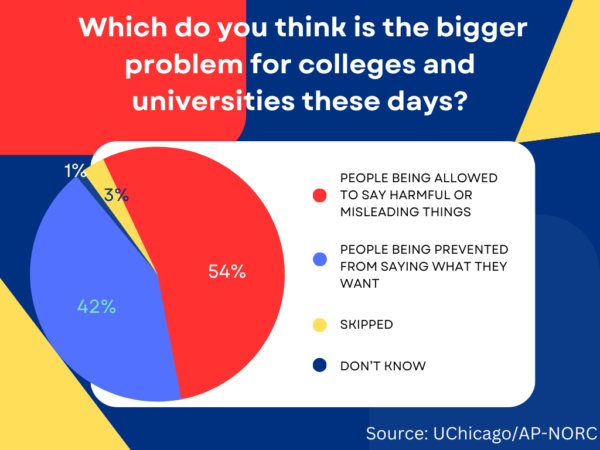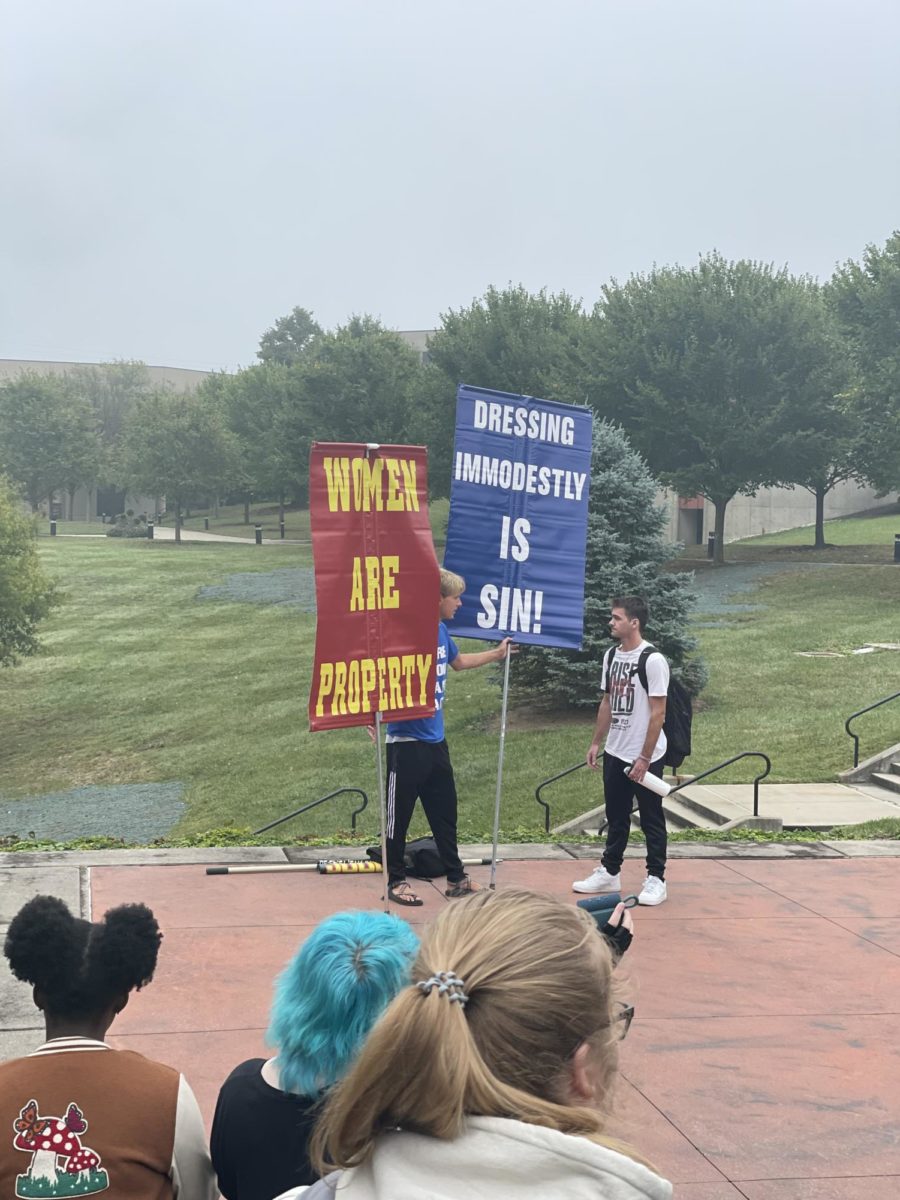Throngs of students congregated around two young men on the steps of the Eva G. Farris Outdoor Amphitheater last Friday, Sept. 29.
The two men, bearing signs and t-shirts which read, “Women are property,” “Are you rape bait?’ and “Dressing immodestly is a sin,” looked on as some students cursed at them in anger, took photos and videos for social media, or stopped and stared in disbelief. At one point during the event, a few girls stood in front of the signs and stripped their clothing in opposition.
Freshman Maddie Smith was enticed to check out what all the fuss was about following her class on Friday. “I was like, ‘Oh, I’m gonna go see this for myself,’” Smith said.
She positioned herself on the front steps near the demonstration in order to hear what the protestors were saying. During her time on the steps, Smith witnessed another student — one she recognized as a classmate — get in front of the sign-holders and yell at students to not listen to their message. This student proclaimed that God still loves the crowd and doesn’t care what clothes they wear, Smith recalled.
To this, the protestors continued to speak out, saying, “[Jesus] doesn’t want you to live in sin and he says you’re being sinful because of how you choose to dress.”
Overall, Smith said the crowd’s reaction was one of anger and frustration. She understood the implications of free speech and that there was not much the university could do to stop the protestors’ message.
“There’s nothing that can be done no matter what they say,” the freshman recognized. “I just think it’s crazy that they were so entitled to come on our campus and harass us and make us feel like we’re a burden when they went out of their way to come to us.”
Members of the NKU Police Department were also present for the provocative event. Police Chief John Gaffin reflected on the role of campus police at such demonstrations.
“We’re mostly there to keep the peace and make sure that the words don’t boil over into assaults or some sort of legitimate criminal offense,” the chief said.
Otherwise, the police hope to engage students in conversations about free speech and why such protestors are allowed to bring their messages to campus.
“A lot of times, [students’] initial response is, ‘Aren’t you going to do something about this? How can you just stand here,’” Gaffin recalled. The department understands students’ frustrations and questions of why they can’t do more, but Gaffin pointed out that there is not much speech that is off limits for public spaces.
It can be hard to understand the intention behind such campus visitors, the chief noted. “I don’t know if these are genuinely held beliefs, or if it’s just professional trolling,” Gaffin said.
Constitutional law professor Kenneth Katkin, who has been an instructor at NKU’s Chase College of Law for 24 years, clarified the legality of these demonstrations. “The Supreme Court has not identified hate speech as a category of speech that loses its First Amendment protection,” Katkin explained.
The law professor also pointed out that the university is a public forum and explained what this meant, stating, “It performs some of the same functions that a public city park or a public sidewalk or something like that would perform. It’s just a place that’s owned by the public, it’s largely open to the public and the public can come hang out and interact with each other.”
While students may have found the provocative speakers unsettling, Katkin stated that under last Friday’s circumstances, offensive speech alone does not generally hold ground for censorship. Police intervention would only be applicable if a high likelihood of threat to an individual was pursued by the demonstrators, said the law professor.
The police do have areas in which they are able to “kick someone out,” said Katkin, but that would only be in circumstances where demonstrators were inside a building and causing disruption to a class, which is not an area generally open to the public.
“When you’re talking about an outdoor space on campus, you’re generally talking about a place that in principle, the general public is invited to be there,” the law professor said. “And so in a free country, people — even idiots — have the freedom to make idiots of themselves.”
A recent survey conducted by the University of Chicago and the Associated Press showed the complexity of the public’s perception of free speech. 90% of respondents said college campuses are places where disparate ideas and values can, and should, be discussed. Along with that, 55% said speakers who said offensive things should not be invited onto campuses.

For students who don’t know how to react, Chief Gaffin recommended that it’s best to just “move along” when they encounter controversial and possibly upsetting displays. Sometimes, demonstrators are hoping for a riled-up response which might turn into an assault or something they can in turn file a lawsuit for, the chief recognized.
Professor Katkin and the police chief both suggested students who oppose the agitators and are willing to engage with them to indulge in a dialogue. Fashioning a counter-argument could be useful in exercising our democracy, Katkin proposed.
At the end of the day, Gaffin also noted the virtues and advantages of the First Amendment, like the free press and open criticism of the government. It can be easy to take for granted our freedom of expression when we look through the lens of such a topic, but there are many good things that come from the First Amendment as well, Gaffin said.


